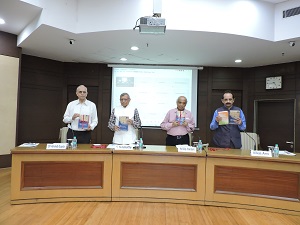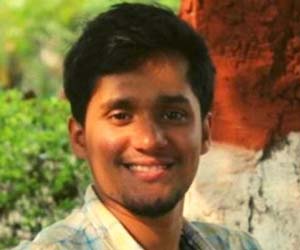On 10 October 2022, Vivekananda International Foundation (VIF) organised a Book Release and Discussion on two books recently published by Aryan Books International and authored by Padmashri Dr. Dilip K. Chakraborty, Professor Emeritus of South Asian Archaeology at Cambridge University & Distinguished Fellow, VIF. The two books are:-
- Nationalism in the Study of Ancient Indian History
- Towards a Nationalist Narrative of India's Ancient Past: Including Recent Research on the Indus Civilization
The books were formally released by Shri. S. Gurumurthy, Chairman of the VIF in the presence of the author, Prof. Dilip K. Chakraborty and the publisher, Shri Rajan Arya of Aryan Books International.
In the first book titled Nationalism in the Study of Ancient Indian History (2020), the author primarily deals with allegations raised against Indian scholars of ancient history, by labeling them as ‘Hindu revivalists’, ‘Nationalists’ and so on by the communists from around the 1960s. The book argues the limitations of this leftist propaganda as the ‘nationalism’ of these scholars of ancient India never stood in the way of their objectivity to history writing. The book also discusses ideas of Tagore and Sister Nivedita on history writing. In the second book, Towards a Nationalist Narrative of India's Ancient Past: Including Recent Research on the Indus Civilization (2022), the author argues that post-independence archaeologists were neocolonial by character and lacked the spirit of nationalism in them, despite making many new discoveries. It takes up the example of archeological findings from the Indus Civilisation, which shows the integrity of Indian civilisations that were perpetually undermined by Indian archaeologists and their foreign counterparts.
In the welcome address Dr. Arvind Gupta, Director VIF said that the History writing in India is dominated by a left liberal colonial outlook that downplayed the continuity of Indian civilisation and cultural unity of Indian people, which is contrary to the evidence. He also mentioned that outsider contribution to India was glorified at the cost of undermining India’s indigenous achievements. On the other hand, India’s influence on the rest of the world in terms of ideas, knowledge and culture were ignored. This contributed to suppression of nationalist voices in India and the cultivating a sense of inferiority among Indians. The Director mentioned that Prof. Chakraborty’s books and articles are relevant in order to set the stage for a fresh look on writing of Indian history based on facts, new discoveries and insights.
The study of ancient India went through a period of decline from the 1960s when it was under the leftist control. If the study of ancient India has to move forward, it has to neutralise the communist influence from the field. He also raised the contemporary challenge of scholars having academic inefficiency coupled with their indifference in international interests. He raised awareness about the unpredictable ways in which the Archeological Survey of India (ASI) grants permissions to foreign authorities and their Indian university agents. This could be read along with the unholy collaboration between a class of western archeologists, their institutions and the ASI, which the speaker mentioned towards the end of this address.
Shri. Gurumurthy began his talk by mentioning that it is of interest to know the truth that makes us closer to the truth than the scholarship. Mere institutional training that we have received may still be irrelevant if we have less interest and passion about the subject that we are learning. Similarly, India’s history could be properly understood by recognising its culture and civilisational characters. He pointed out that the early argument that India lacks history came to life because India didn’t have wars the way the Western world was having. Back then, especially, History was all about wars and more wars or ‘planned accidents’. On the other hand, India had war codes and stories that prevent wars, which need not be recorded; therefore, what we have is a history, method and philosophy of avoiding wars. However, he mentioned that during a period in the history of India, there was a ‘deceptive peace period’ that drove Indians to inaction and the statecraft did not find a point in keeping large armies. He hinted that the history of Arthasastra and its decline from a period of relevance could be read as the decline of Indian strategic thinking. This is because Indian strategic thinking rooted in Arthasastra not only discusses how to prevent wars but also about how to have noble warfare. Another peculiar feature that Shri. Gurumurthy highlighted is that, in Indian history, the Kings did not have a determinative role, which prevented them from taking power for granted. He added that the Indian concepts of Desha, Rashtram and Jana are indigenous and existed way before the idea of nation-states in modernity. He also mentioned about the mobility between communities living in the forest and plains, which makes all of us indigenous to this land and hence, India’s Vanavasis cannot be seen in the same way as we see tribals or aboriginals in the Western countries, who were forcefully sidelined by the outsiders. Citing various examples, his talk argued that India’s history is not the history of violence, rather a history of preventing wars and curbing its propensity. He stressed that it must be a lesson from India’s history to the world on how it prevented and managed wars. As final remarks, he said that, unless we write the history of peace, we cannot write the history of India. In other words, as long as history writing is obsessed with the records of violence, one may feel that India is less significant in history.
The session ended with Prof. Dilip K. Chakraborty’s response to some of the queries raised by Shri. Gurumurthy in his talk and interaction with the audience.







Post new comment